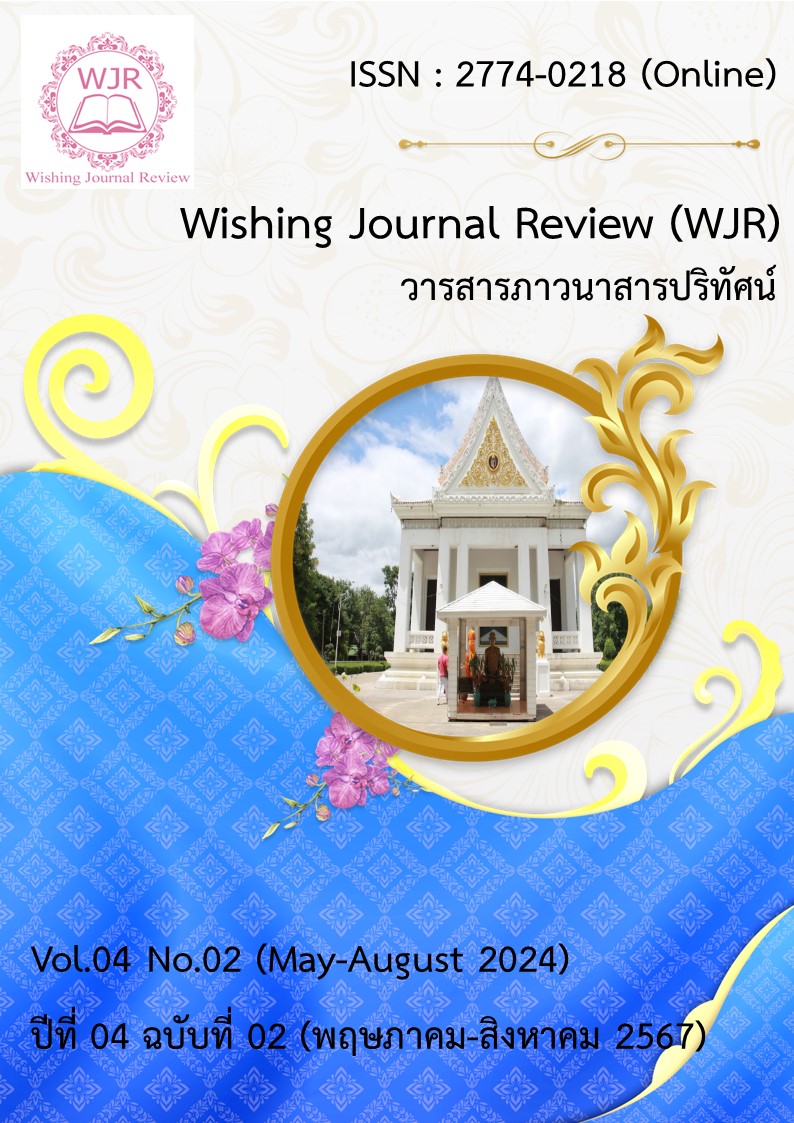Guidelines for Student Affairs Administration to Promote 8 Desirable Characteristics According to The Sustainable Development Concept of Tha Chin Inter-School Group Under the Office of Samut Sakhon Primary Educational Service Area
Keywords:
Guidelines for Student Affairs Administration, Desirable Characteristics, Sustainable DevelopmentAbstract
Education is regarded an imperative foundation in developing the potential of human resources to contribute to the organization, the nation, and the world. Such development include cognitive, affective, and psychomotor domains that result in the acquisition of knowledge and competencies to make a living and survive, and also shape people for their conscience and morality, as the ones being developed intellectually and mentally and as valuable citizen of Thai society and world society as well. Since rapid changes by the globalization trend of social conditions today enormously affects students' learning behavior, a lot of students are unable to adapt to such social changes and act in a derogatory way, and even cause problems in schools and society. It is thus essential that students are equipped with the combination of knowledge substances, the concept of being a perfect human physically, mentally, emotionally, socially, and intellectually, and the new age technological skills and knowledge to ensure that they become good and smart person and accepted by society in the future. The present research on guidelines for student affairs management to promote 8 desirable characteristics based on sustainable development concept was aimed to (1) explore the current state (2) explore the desirable state, and (3) propose guidelines for student affairs management to promote 8 desirable characteristics based on sustainable development concept among Tha-Chin affiliated schools under the Samutsakhon Primary Educational Service Area Office. Quantitative research approach was used and included a sample group of school administrators and teachers of Tha-Chin affiliated schools under the Samutsakhon Primary Educational Service Area Office, in 2023 academic year. The sample size was determined based on the table of Krejcie and Morgan (1970, p 608), obtaining a sample group of totally 193 persons after classifying groups by number in the table and using a simple random sampling method. The number of questionnaire respondents was 169, accounting for 93.89%. Research instrument was a 5-point rating scale questionnaire with IOC in a range of .67 - 1.00 and reliability of .75. The analysis was performed for Priority Need Index Modified. Informants were 15 experts. The instrument to evaluate the propriety and feasibility was a 5-point rating scale evaluation form. Research statistics involved percentage, mean, standard deviation, and Priority Need Index Modified.
Research results pertaining to student affairs management to promote 8 desirable characteristics based on sustainable development concept among Tha-Chin affiliated schools under the Samutsakhon Primary Educational Service Area Office was found in overall at a moderate level for the current state (==3.28 S.D.=.28) and at a highest level for the desirable state (==4.52,S.D. .22). The priority need for the implementation of student assistance system was reported highest, as weakness (PNImodified =0.396), followed by the promotion and development of students’ discipline, morality, and ethics (PNImodified =0.391), and implementation to promote democracy in school (PNImodified =0.379) as weaknesses. These were taken to formulate guidelines for student development comprising 3 main approaches and 9 sub-approaches. Main approach 1: Developing the implementation of sustainable student assistance system. Sub Approach 1.1 Developing activities to promote an emphasis on critical thinking and problem solving thinking. Sub Approach 1.2 Developing the organization of activities to promote the use of participative decision making. Sub Approach 1.3 Developing the organization of activities to promote multi-disciplinary and holistic educational management. Main Approach 2: Developing the promotion of students’ value of Thainess. Sub Approach 2.1 Developing the establishment of value for Thai living. Sub Approach 2.2 Developing the drive to reinforce local value. Sub Approach 2.3 Developing the participation and recognition of the value of Thainess. Main Approach 3: Developing the promotion of democracy in consistent with the local culture. Sub Approach 3.1 Developing the organization of activities to promote morality and ethics based on the local way. Sub Approach 3.2 Developing the use of between-locality multiple methodology. Sub Approach 3.3 Developing the drive for cultural innovation construction.
References
บรรณานุกรม
กานดา ผิวสวัสดิ์. (2556). สภาพการดำเนินงานระบบดูแลช่วยเหลือนักเรียนของสถานศึกษา ขั้นพื้นฐาน
สังกัดสำนักงานเขตพื้นที่การศึกษาประถมศึกษาหนองคาย เขต 1. (วิทยานิพนธ์ศึกษาศาสตร
มหาบัณฑิต, มหาวิทยาลัยปทุมธานี).
กรฤทธิ์ บุญญานุกูล. (2559). ความคิดเห็นของครูที่มีต่อการบริหารงานกิจการนักเรียนของโรงเรียน
เครือข่ายอำเภอชาติตระการ จังหวัดพิษณุโลก. (วิทยานิพนธ์ศึกษาศาสตรมหาบัณฑิต,
มหาวิทยาลัยเชียงใหม่).
กฤษณ์ จันทะวงค์. (2553). แนวปฏิบัติในการแก้ปัญหาการบริหารงานกิจการนักเรียนโรงเรียนวชิรวิทย์ ฝ่ายมัธยม (วิทยานิพนธ์ศึกษาศาสตรมหาบัณฑิต) สืบค้นจาก https://cmudc.library.cmu.ac.th/frontend/Info/item/dc:113369
กระทรวงศึกษาธิการ. (2542). พระราชบัญญัติการศึกษาแห่งชาติ พ.ศ. 2542. กรุงเทพฯ: โรงพิมพ์องค์การค้าคุรุ สภา.
กระทรวงศึกษาธิการ. (2553). แนวทางการจัดการเรียนรู้ตามหลักสูตรแกนกลางการศึกษาขั้นพื้นฐาน พุทธศักราช 2551. กรุงเทพฯ: ชุมนุมสหกรณ์การเกษตรแห่งประเทศไทย.
พระราชบัญญัติการศึกษาแห่งชาติ พ.ศ. 2542 และที่แก้ไขเพิ่มเติม พ.ศ. 2545 มาตรา 23 (4). (2565). [สืบค้น เมื่อ 18 มีนาคม 2566]. [ออนไลน์]. สืบค้นจาก https://skm.go.th/portal/wp- content/uploads/2022/06/03.pdf
ชาญชัย จิตรเหล่าอาพร, จิดาภา ถิรศิริกุล และสกล สุขเสริมส่งชัย.(2547). กลุ่มนิเทศ ติดตามและประเมินผลการ จัดการศึกษา. การปฐมนิเทศโครงการโรงเรียนวิถีพุทธ 29 กันยายน 2547. ตรัง: [ม.ป.ท.].
ฉัตรชัย ตวงรัตนพันธ์. (2565). [สืบค้นเมื่อ 18 พฤษภาคม 2562]. จาก VUCA world สู่ BANI [ออนไลน์]. สืบค้น จาก world. https://www.bangkokbiznews.com/blogs/business/business/1033959.
นาวี กรีธาทรัพย์. (2553). การศึกษาสภาพและปัญหาการบริหารงานกิจการนักเรียนโรงเรียนเทศบาลวัด
ทรงธรรม สังกัดเทศบาลเมืองพระประแดง จังหวัดสมุทรปราการ. (วิทยานิพนธ์ศึกษาศาสตร
มหาบัณฑิต, มหาวิทยาลัยนเรศวร).
พรรณี ลีกิจวัฒนะ. (2558). วิธีการวิจัยทางการศึกษา. กรุงเทพฯ : มีน เซอร์วิส ซัพลาย. สุวิมล ว่องวาณิช. (2558). การวิจัยประเมินความต้องการจำเป็น. (พิมพ์ครั้งที่ 3). กรุงเทพฯ, สำนักพิมพ์แห่งจุฬาลงกรณ์มหาวิทยาลัย.
สุวิทย์ เมษินทรีย์. (2022). [สืบค้นเมื่อ 18 มีนาคม 2566]. ปัญญาเพื่อการพัฒนาที่ยั่งยืน. [ออนไลน์]. สืบค้น จาก https://thaipublica.org/2022/09/suvit-maesincee29/
สำนักงานเขตพื้นที่การศึกษาประถมศึกษาสมุทรสาคร. [สืบค้นเมื่อ 18 พฤษภาคม 2562]. โรงเรียนขยายโอกาส สำนักงานเขตพื้นที่การศึกษาประถมศึกษาสมุทรสาคร. [เว็บบล็อก]. สืบค้นจาก www.skn.go.th/
สำนักบริหารงานการมัธยมศึกษาตอนปลาย สำนักงานคณะกรรมการการศึกษาขั้นพื้นฐาน
กระทรวงศึกษาธิการ. [สืบค้นเมื่อ 18 พฤษภาคม 2562]. มาตรฐานการปฏิบัติงานโรงเรียน
มัธยมศึกษา พ.ศ. 2552. [เว็บบล็อก]. สืบค้นจาก https://www.maetha.ac.th/home/
อาทิตยา เวชกรณ์. (2559). แนวทางการบริหารงานกิจการนักเรียนของสถานศึกษาขั้นพื้นฐาน สังกัด
สํานักงาน คณะกรรมการส่งเสริมการศึกษาเอกชน ในจังหวัดนครสวรรค์. (วิทยานิพนธ์
ครุศาสตรมหาบัณฑิต, มหาวิทยาลัยราชภัฏนครสวรรค์).
Krejcie, R.V., & D.W. Morgan. (1970). “Determining Sample Size for Research Activities”. Educational and Psychological Measurement. 30(3) : 607 – 610.
UNESCO. (2006). UN Decade of Education for Sustainable Development 2005- 2014
Asia–Pacific Region. Retrieved from http://www.unesco.org/education/desd(ED2006/WS/52
Downloads
Published
How to Cite
Issue
Section
License
Copyright (c) 2024 Wishing Journal Review

This work is licensed under a Creative Commons Attribution-NonCommercial-NoDerivatives 4.0 International License.



